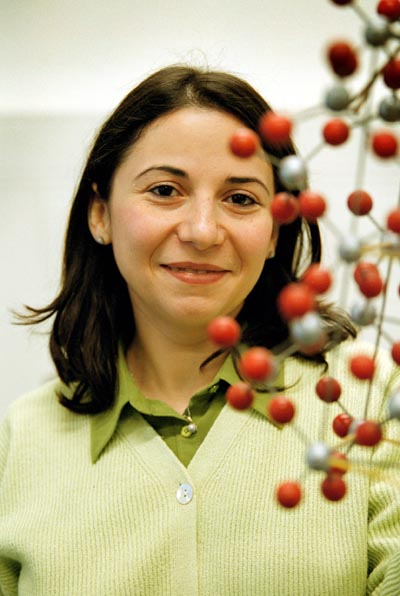Untitled Document
"Making Friends is Important"
Have you ever seen an injured football player with a
steel pin in his leg? It looks like a mediaeval torture device
and probably feels like one too. Dr. Cornelia Moisescu from Bucharest
is one of the people researching implant material that will enable
the body to grow viable new bone after bad fractures and so dispense
with this kind of painful treatment. A special glass ceramic with
'needle-like apatite' that Moisescu has been working on, looks
like it has a future as an implant material to replace various
kinds of bones, and even teeth. Cursor recently talked to her
about life and work at TU/e.
 Moisescu moved to Eindhoven in
September 2000 to fill a post-doc position at TU/e's Chemical
Engineering department. She chose the job in Eindhoven over one
in San Francisco. "TU/e has a good reputation and I wanted
to stay in Europe. Moving to a new place all by myself, it's important
to make some friends. And research institutes in America are not
well known for their warm, friendly atmosphere. I don't think
America is a good place for me. I find I get along well with people
here at TU/e. My colleagues are generally open and direct, so
I'm free to be direct also."
Moisescu moved to Eindhoven in
September 2000 to fill a post-doc position at TU/e's Chemical
Engineering department. She chose the job in Eindhoven over one
in San Francisco. "TU/e has a good reputation and I wanted
to stay in Europe. Moving to a new place all by myself, it's important
to make some friends. And research institutes in America are not
well known for their warm, friendly atmosphere. I don't think
America is a good place for me. I find I get along well with people
here at TU/e. My colleagues are generally open and direct, so
I'm free to be direct also."
Traveller
Cornelia Moisescu is settling in well, although she misses the
wooded hills of her native Rumania. "But that's all right,
it's not too hard to get back to Rumania from here. I have a big
family spread all over the country, so I can go back for a holiday
now and again. I'm going back for Easter. I'm planning on doing
some hiking in the mountains."
"Here in the Netherlands I'm into exploring old cities, such
as Maastricht and Amsterdam. Eindhoven is not such an exciting
place for culture, so I miss that after living in places like
Bucharest, Jena and Turin. And a strange thing I've noticed in
Eindhoven: you can't get anything to eat in a restaurant after
about 9.30."
The Rumanian materials scientist has travelled all over Europe.
She took her Ph.D. in Jena, in former East Germany. Jena has traditionally
been known for its thermo-resistant glass and the discovery of
the microscope. It was therefore the ideal place for Moisescu
to work on new kinds of ceramic glass. "I learnt many useful
things from the experts there," she says.
Moisescu also spent time on research in Turin. In the process
of her travels she learned to speak fluent German, Italian and
English. Now she's progressed to Dutch and has already signed
up for the intermediate course. "I think you miss a great
opportunity if you don't learn the language of a country you live
in," she declares.
Research on glass ceramic implant materials has progressed to
the point where new materials are being tested on animals. Moisescu
is working with TNO on a polymer composite that is more cohesive
than materials currently in use. "I'm trying to improve the
mechanical properties of this material so that it can be used
for larger bone implants and dental work. I'm working on the synthesis
of a nano particle that mimes the structure of bone. The idea
is that this material could be more easily accepted by the human
body and could therefore facilitate controlled growth of the bone."
The next step for Moisescu will be to get outside companies interested
in patenting this material. "Post-doc work is challenging
because there's nobody telling you what to do. Most research takes
time and patience. A new cooling system developed here especially
for my work will be a big help. It was just finished today, so
I'm happy about that."
"Excuse me, I have to run, I have something in the furnace."/.
Dr. Cornelia Moisescu: "I think you miss
a great opportunity if you don't learn the language of a country
you live in." Photo: Bram Saeys







